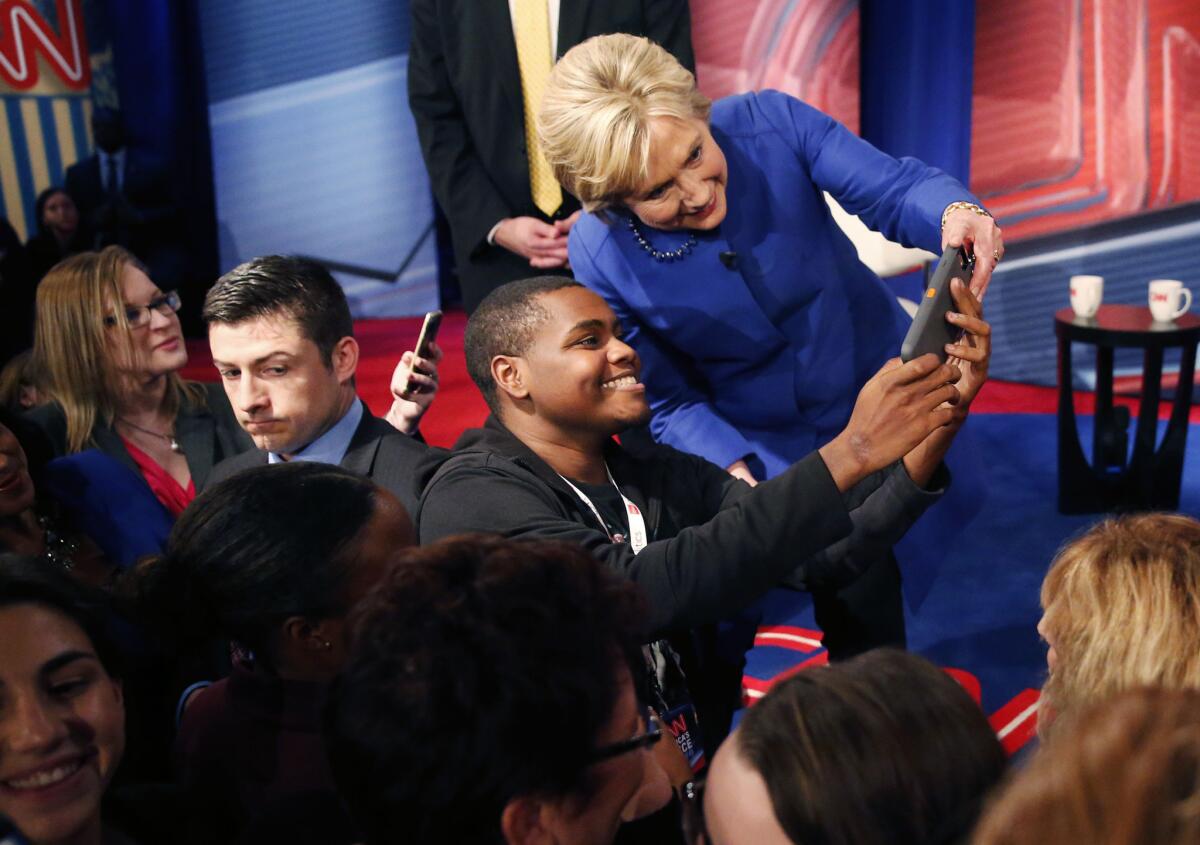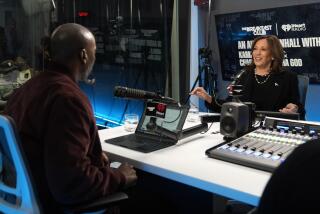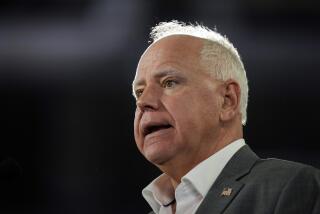Analysis:: If Clinton manages to improve her image with voters, she can thank town halls

Hillary Clinton poses for photos with audience members after a CNN town hall event at the University of South Carolina School of Law in Columbia on Feb. 23.
- Share via
If Hillary Clinton manages by the end of this campaign to dramatically improve her image, she can credit the cable TV networks and the town halls they have aired incessantly for weeks.
Republican presidential candidates have been throwing around accusations of lying and deceitful campaign tactics. The Republican establishment -- what’s left of it -- has been tying itself into pretzels trying to figure out a way to knock out Donald Trump, the front-runner who on Tuesday won his third successive state -- but who, many in the party feel, would doom them in November.
At the same time, Clinton and her challenger, Vermont Sen. Bernie Sanders, have gotten gobs of free airtime to soften their edges or toughen their resumes, whatever their need.
TRAIL GUIDE: All the latest news on the 2016 presidential campaign >>
The town hall format like the one on CNN Tuesday night seems to particularly benefit Clinton, in part because she is the one whose image has needed rebooting. She has had persistent problems convincing voters that she’s trustworthy and cares about them, for starters -- key elements in a general-election decision.
For her, the town halls give one of the world’s best known -- and most caricatured -- women an extended, nationally televised and free opportunity to craft a more appealing visage.
Candidates like town halls because they are not debates. Clinton’s allies, in fact, tried to limit the number of Democratic debates this year, a somewhat inexplicable decision considering she’s won all of them.
Instead of the face-to-face battle, the one-after-the-other format makes one or the other the center of attention, before an audience happy to be there. For a solid hour Tuesday night, voters asked each Democrat questions, and they didn’t go after the candidates as much as professional questioners would have.
No one asked Clinton on Tuesday about a federal judge’s ruling hours earlier that her aides could be questioned in a lawsuit about the private email server she used as secretary of State.
If anything, the town halls this year have gone quirky, forcing the candidates off their oft-repeated talking points and into interesting character territory with questions such as the one posed to Clinton on Tuesday: How will you harness the power of forgiveness as president?
“I could not be standing here if I had not been forgiven many times and if I had not been able to forgive, myself, those who I thought had in some way disappointed or wronged me,” she replied. “I as a person of faith believe profoundly in the power of forgiveness.”
To anyone watching, it was a simultaneous reminder of multiple things that arguably helped Clinton: her little-known but lifelong faith, her hard-fought loyalty to Bill Clinton after his presidential affair with an intern, and a sense of humility that doesn’t often enter the campaign arena.
Clinton, who can knit an astonishing amount of policy detail into any town hall answer, went on to describe South Africa’s post-apartheid reconciliation program, and then doubled back to this country with what appeared to be a slap at the Republican candidates.
Join the conversation on Facebook >>
“I see so much anger and fear and bitterness, some of it being played out in our political system right now: the kind of language being used, violent images, threats against people,” said Clinton, speaking a day after Trump, at a campaign event, had talked about wanting to punch a protester.
“It is deeply troubling to me because we need to try to unite our country, not divide it, if we’re going to deal with the challenges we face.”
Clinton also offered an evocative answer to a question about racial differences in the country, and used a light touch when asked a question by a young law student who said she was in Sanders’ camp even though her mother was voting for Clinton.
The young woman asked about student debt, and after a lengthy and detailed answer about her plans for the college loan system, Clinton let her go with a joking: “Go talk to your mother.”
Her image-smoothing commentaries in South Carolina followed similar occurrences in Nevada and New Hampshire.
Sanders would seem to be a prime beneficiary of the extended and largely uncritical coverage that the town halls offer, but he hasn’t been in a position to take full advantage of them.
For one thing, he tends to beat the same drum he does in his speeches: the political system is corrupt, the economy is rigged, the middle class has been abandoned. And extended riffs about Clinton’s Wall Street connections don’t seem to hit as hard when she’s not standing next to him on stage.
Whether because of his fierceness -- or because the audience is trying to figure how Clinton’s friendly town hall demeanor squares with the notion that she’s a cold fish -- he also doesn’t get as many thought-provoking questions as Clinton does.
His questions have a largely unspoken theme: Nice ideas, but how exactly would you get them passed?
He bridled a bit on Tuesday when asked about a Clinton ad that accused him of being a “single-issue” candidate focused only on punishing Wall Street. He went on at length about other things he cares about -- rebuilding the nation’s infrastructure, making college tuition free, pay equity for women. Then he interrupted himself to focus anew on Wall Street, which was, he said, enormously important.
Clinton and Sanders have gone out of their way to praise one another at these events, which only sharpens the contrast with Republicans engaged in a bloody and unrepentant battle.
Just in the last few days, Trump all but sanctioned violence against campaign protesters while belittling his challengers, calling Texas Sen. Ted Cruz “sick.” Rubio complained about Cruz’s tactics against him and another candidate, Ben Carson. And Cruz had to fire his spokesman after the spokesman spread a video that wrongly questioned Rubio’s faith (and went a ways to confirming Rubio’s complaints.)
No one on that side of the aisle was talking about forgiveness.
For political news and analysis, follow me on Twitter: @cathleendecker . For more on politics, go to latimes.com/decker
ALSO
Trump wins Nevada caucuses, fortifying his lead in the Republican race
What you need to know about the search for Scalia’s successor
More to Read
Sign up for Essential California
The most important California stories and recommendations in your inbox every morning.
You may occasionally receive promotional content from the Los Angeles Times.











